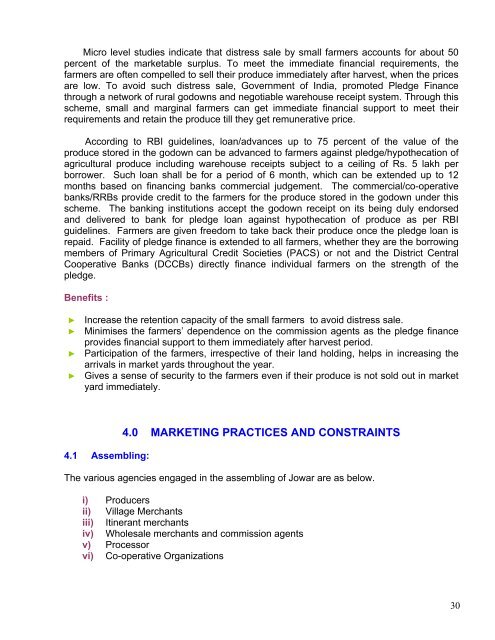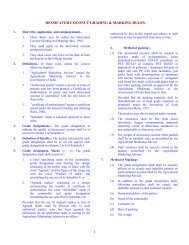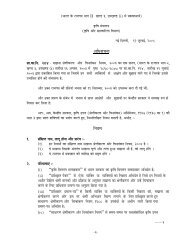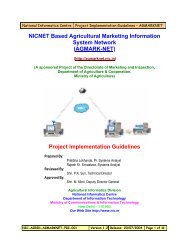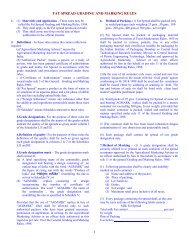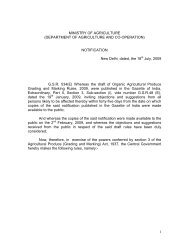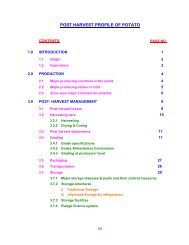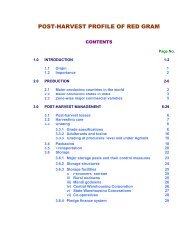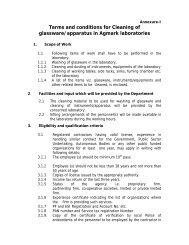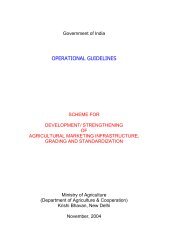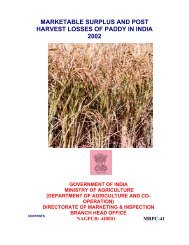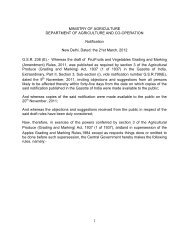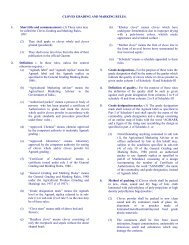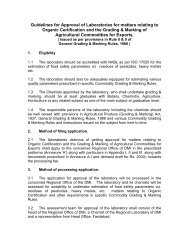POST HARVEST PROFILE OF JOWAR - Agmarknet
POST HARVEST PROFILE OF JOWAR - Agmarknet
POST HARVEST PROFILE OF JOWAR - Agmarknet
You also want an ePaper? Increase the reach of your titles
YUMPU automatically turns print PDFs into web optimized ePapers that Google loves.
Micro level studies indicate that distress sale by small farmers accounts for about 50<br />
percent of the marketable surplus. To meet the immediate financial requirements, the<br />
farmers are often compelled to sell their produce immediately after harvest, when the prices<br />
are low. To avoid such distress sale, Government of India, promoted Pledge Finance<br />
through a network of rural godowns and negotiable warehouse receipt system. Through this<br />
scheme, small and marginal farmers can get immediate financial support to meet their<br />
requirements and retain the produce till they get remunerative price.<br />
According to RBI guidelines, loan/advances up to 75 percent of the value of the<br />
produce stored in the godown can be advanced to farmers against pledge/hypothecation of<br />
agricultural produce including warehouse receipts subject to a ceiling of Rs. 5 lakh per<br />
borrower. Such loan shall be for a period of 6 month, which can be extended up to 12<br />
months based on financing banks commercial judgement. The commercial/co-operative<br />
banks/RRBs provide credit to the farmers for the produce stored in the godown under this<br />
scheme. The banking institutions accept the godown receipt on its being duly endorsed<br />
and delivered to bank for pledge loan against hypothecation of produce as per RBI<br />
guidelines. Farmers are given freedom to take back their produce once the pledge loan is<br />
repaid. Facility of pledge finance is extended to all farmers, whether they are the borrowing<br />
members of Primary Agricultural Credit Societies (PACS) or not and the District Central<br />
Cooperative Banks (DCCBs) directly finance individual farmers on the strength of the<br />
pledge.<br />
Benefits :<br />
► Increase the retention capacity of the small farmers to avoid distress sale.<br />
► Minimises the farmers’ dependence on the commission agents as the pledge finance<br />
provides financial support to them immediately after harvest period.<br />
► Participation of the farmers, irrespective of their land holding, helps in increasing the<br />
arrivals in market yards throughout the year.<br />
► Gives a sense of security to the farmers even if their produce is not sold out in market<br />
yard immediately.<br />
4.1 Assembling:<br />
4.0 MARKETING PRACTICES AND CONSTRAINTS<br />
The various agencies engaged in the assembling of Jowar are as below.<br />
i) Producers<br />
ii) Village Merchants<br />
iii) Itinerant merchants<br />
iv) Wholesale merchants and commission agents<br />
v) Processor<br />
vi) Co-operative Organizations<br />
30


